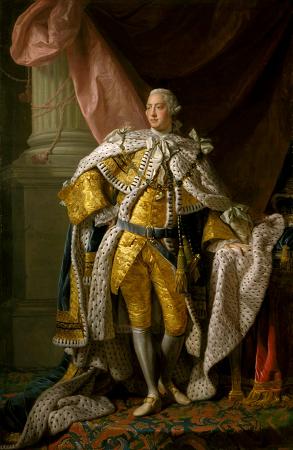George II (1683 - 1760). George II was King of Great Britain and Ireland, Duke of Brunswick-Lüneburg and a prince-elector of the Holy Roman Empire from 11 June 1727 until his death in 1760. George was the last British monarch born outside Great Britain: he was born and brought up in northern Germany. The Act of Settlement 1701 and the Acts of Union 1707 positioned his grandmother, Sophia of Hanover, and her Protestant descendants to inherit the British throne. After the deaths of Sophia and Anne, Queen of Great Britain, in 1714, his father, the Elector of Hanover, became George I of Great Britain. In the first years of his father's reign as king, George was associated with opposition politicians, until they rejoined the governing party in 1720. As king from 1727, George exercised little control over British domestic policy, which was largely controlled by the Parliament of Great Britain. As elector, he spent twelve summers in Hanover, where he had more direct control over government policy. He had a difficult relationship with his eldest son, Frederick, who supported the parliamentary opposition. During the War of the Austrian Succession, George participated at the Battle of Dettingen in 1743, and thus became the last British monarch to lead an army in battle. In 1745 supporters of the Catholic claimant to the British throne, James Francis Edward Stuart, led by James's son Charles Edward Stuart, attempted and failed to depose George in the last of the Jacobite rebellions. Frederick died unexpectedly in 1751, nine years before his father, so George II was ultimately succeeded by his grandson, George III. For two centuries after George II's death, history tended to view him with disdain, concentrating on his mistresses, short temper, and boorishness. Since then, reassessment of his legacy has led scholars to conclude that he exercised more influence in foreign policy and military appointments than previously thought. George was born in the city of Hanover in Germany, followed by his sister, Sophia Dorothea, three years later. Their parents, George Louis, Hereditary Prince of Brunswick-Lüneburg, and Sophia Dorothea of Celle, both committed adultery. In 1694 the marriage was dissolved on the pretext that Sophia had abandoned her husband. She was confined to Ahlden House and denied access to her two children, who probably never saw their mother again. George spoke only French, the language of diplomacy and the court, until the age of four, after which he was taught German by one of his tutors, Johann Hilmar Holstein. In addition to French and German, he was also schooled in English and Italian, and studied genealogy, military history, and battle tactics with particular diligence. George's second cousin once removed, Queen Anne, ascended the thrones of England, Scotland, and Ireland in 1702. She had no surviving children, and by the Act of Settlement 1701, the English Parliament designated Anne's closest Protestant blood relatives, George's grandmother Sophia and her descendants, as Anne's heirs in England and Ireland. Consequently, after his grandmother and father, George was third in line to succeed Anne in two of her three realms. He was naturalized as an English subject in 1705 by the Sophia Naturalization Act, and in 1706, he was made a Knight of the Garter and created Duke and Marquess of Cambridge, Earl of Milford Haven, Viscount Northallerton, and Baron Tewkesbury in the Peerage of England. England and Scotland united in 1707 to form the Kingdom of Great Britain, and jointly accepted the succession as laid down by the English Act of Settlement. George's father did not want his son to enter into a loveless arranged marriage as he had, and wanted him to have the opportunity of meeting his bride before any formal arrangements were made. Negotiations from 1702 for the hand of Princess Hedvig Sophia of Sweden, Dowager Duchess and regent of Holstein-Gottorp, came to nothing. In June 1705, under the false name Monsieur de Busch, George visited the Ansbach court at its summer residence in Triesdorf to investigate incognito a marriage prospect: Caroline of Ansbach, the former ward of his aunt Queen Sophia Charlotte of Prussia. The English envoy to Hanover, Edmund Poley, reported that George was so taken by the good character he had of her that he would not think of anybody else. A marriage contract was concluded by the end of July. On 22 August / 2 September 1705 Caroline arrived in Hanover for her wedding, which was held the same evening in the chapel at Herrenhausen. George was keen to participate in the war against France in Flanders, but his father refused to let him to join the army in an active role until he had a son and heir.
more...






